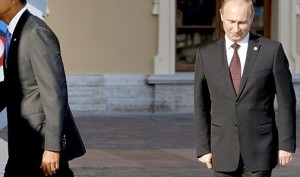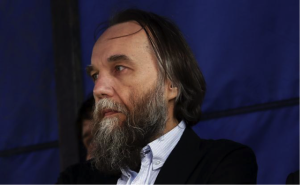Political Analysts Dugin and Klein
Hoodwinked by Elite-Run Media
by Karl PomeroyHoodwinked by Elite-Run Media
Quemado Institute
November 24, 2015
Posted November 27, 2015
 |
| Barack Obama, Vladimir Putin (--telegraph.co.uk) |
I can say this because of my relative neutrality. As a retired applied-mathematical engineer, almost 100 percent of my world news comes from alternate websites, some of them Russian, some even in the Russian language. The only exception is that I read books by American investigative journalists. (What books there are, that is. Oddly enough, at around the time the NSA demanded that US libraries turn over secret lists of borrowers, books by investigative journalists nearly disappeared from the shelves.) And of course I talk to others who read and watch Western media reports. But I have no direct exposure. The lies make me too uncomfortable.
So I am coming from a different perspective. And from my viewpoint, all this hostility between the US and Russia is media-manufactured nonsense. Russia is not trying to destroy the United States, and the US is not trying to destroy Russia. I will back this up with arguments.
There are those who are trying to destroy the sovereignty of all nations and replace it with their own control. These are the transnational corporations and global financial interests, especially those in the fields of banking, energy and agribusiness. They have seized command of all important governments to one extent or another. Washington is virtually completely controlled by the financial elite, and Moscow, by the oligarchs, which belong, in the final analysis, to the same extended group.
What do I mean by "important governments"? Those governments that have strong militaries, large resource bases, and/or advanced technology. It doesn't matter whether they have thriving economies: neither Russia nor the United States enjoy economic wealth among their citizens. At least, not any more. But that makes no difference to the global financial elite. It will as time goes on. Yet they continue to act as if they don't realize they will eventually have to pay the price.
For now, what the elite wants are armies that can take over resource-rich countries, such as those in Africa or the Middle East; countries that themselves have abundant energy resources, such as Russia and Saudi Arabia; and countries that possess the technology needed to exploit these resources, such as the EU nations, the United States and Russia.
The moneyed elite do not yet realize---or at any rate do not act like they realize---that if they continue to gut the economies of the world, they will have nothing left to buy with their money and no pretty places to live. As I have said before, an island in the Mediterranean is not what it used to be. If the elite keep running the world into the ground, they will not have any handicraft or manufacturing base to draw on when they go to furnish their extravagant mansions, since no one will be making luxurious furniture, rugs, cookware, artware, automobiles, yachts and the like, and the knowledge of the artisans will have been lost. And if every former paradise becomes a haven for terrorists or a campground for refugees, the elite will have nowhere to build their castles.
At some point, the financial powers must recognize that what goes around, comes around. If they want a beautiful environment in which to spend their money, they need to encourage the base economies of all the world nations---local economies which depend on individual enterprise under liberated conditions with plentiful resources and available currency.
Money is an infrastructure. Like road systems, power grids and communications networks, money should be regulated by governments in the interest of the citizens. Money is the infrastructure that enables commerce. It is not an item to be hoarded, controlled, stolen, siphoned off, or priced at a profit for the wealthy. By doing all of these things, the global financial moguls are choking the very economies that provide them their luxuries. Borrowing is not the same as having, yet lending has become the means of distrubuting money to purchasers, even though debt chokes off this essential infrastructure and grinds the world's economies to a halt. If this trend continues, the transnational powers-that-be will have nowhere to go and nothing to buy. They are killing the goose that laid the golden egg.
In their ongoing deluded ignorance, short-sighted greed has led these moguls to seize control of most Western governments, as well as those of Russia, China and others. But the financial elite does not want us to know they have taken control of our governments. They are wary of public reaction. So they use their own media to create the illusion that countries are still sovereign, that they are enemies of one another, and that this sort of inter-country conflict is the cause of the world's problems. All of these notions are false. It is the old tactic of divide and conquer; it keeps us distracted while deflecting blame from the culprits.
Yet the truth is, so-called nations are no longer sovereign, but are fully controlled by the global cartels. Most of the world's nations share many common interests. We need not be enemies at all, and are not enemies in reality, if one looks beyond the manufactured illusions. But the powers-that-be don't want us to know this.
Thus, Russian-oriented political analysts such as Alexander Dugin, Rostislav Ischenko, Boris Rozhin, El Murid and The Saker hold radically paranoid and illusory notions about the intent of the United States government, conflating it as they do with the global elite that controls the US government. Hence, they imagine the US wants to surround and destroy the Russian Federation, to assassinate Vladimir Putin, to overthrow the Russian cultural traditions and so forth. They argue these positions extensively, and it certainly appears that they are correct on the face of it. The US government is acting in such a way as to give this erroneous impression, an impression manufactured by the elite-owned media which pounds on this theme without end.
But the US government, in and of itself, is fragmented and incoherent, and lacks any integrated self-serving foreign policy. The impression of a coherent strategy aimed at destroying Russia is a concoction of the financial elite, conveyed by their own media outlets. Again: divide and conquer.
Actually, Russian and American interests are almost entirely aligned, if one steps above the common brainwashed thinking imposed on us by the elite. Yet, the US also has a mirror-image impression that Russia is out to destroy it. American analysts are just as paranoid as their Russian counterparts, and harbor beliefs about Russian aggression that are just as ridiculous. American political analysts contend that Russia is trying to take over Europe, expand its sphere in the Middle East, and recreate the Soviet Union. While many countries the world over might covet additional territory, few are willing to pursue this at the cost of friendly relations with their neighbors. Russia certainly does not want create enemies across the West in exchange for a few thousand square kilometers of eastern Europe.
Yet the elite-owned media works day and night to make it appear so, often using Crimea as an absurd case in point. Russia did not acquire Crimea out of a lust for additional territory. That Americans believe this is tantamount to media-manufactured psychosis. Russia took Crimea as a purely defensive reaction, after the West promoted a coup that wiped out Ukraine's democratic government, threatening not just the culturally Russian people in Crimea and Donbass, but also Russia's most strategic port of access to the Mediterranean Sea. Putin had no choice but to take Crimea, and thereby save the tatters of the Russian domain. It was a defensive move in reaction to an American offensive.
But the elite would not have Americans know this. And so both Americans and Russians, essentially brainwashed by the same financial tyrants, have become irrationally paranoid about one another's governments. The truth is, both governments have lost control of their foreign interests to a large degree. Broadly speaking, these governments are run by figureheads. Barack Obama is a puppet, and so is Vladimir Putin. Let me explain.
Russians take great pride in their leader, and do not want to believe he is a puppet. But if Putin were in command, he would not have abandoned Donbass to its tragic fate under the rule of the Kiev nazis. Putin proved he could not stand up to pressure from the Western puppet leaders. He caved in totally, inviting mass slaughter of his own Russian compatriots in the Donetsk and Lugansk regions, homeland of the undeniably Russian composer Sergey Prokofiev. Putin is not so cruel as to abandon his own kind. He had no choice. And that he had no choice proves he has no power in Russia's foreign affairs.
Despite this dynamic of divide and conquer by the uberwealthy, and despite that many ordinary people are aware of the lies of the media, Russian analysts still contend that Obama has a strategy aimed at destroying Russia. Yet Putin has talked to Obama in person. Putin must realize the man has little intellect---and surely not an intellect capable of devising a deliberate strategy. Obama's mind is not that sophisticated.
When Obama first began his presidential run in 2008, I read one paragraph---a single random passage---from the middle of his book Audacity of Hope. I could tell from those few sentences that his mind was like that of a teenager: vacuous and childish. The paragraph read like something someone would say who was running for President of a High School Student Council. It was naive, fantastically idealistic, insipid and impractical. I knew beyond a doubt he would make a disastrous president. What I could not understand was why anyone was fooled by him. Surely Putin isn't fooled by him.
What this means is, Obama is not running the United States of America. He is a weak, naive and confused figurehead who is entirely manipulated from the outside. This of course does not mean Obama is incapable of violent aggression, only that he would carry it out with no coherent strategy, and in particular no strategy beneficial to the United states as a soveriegn nation.
Putin is a far stronger figure, a brilliant intellectual, and a wealthy oligarch himself. But he has also lost control of the Russian sphere, as I have argued above. It goes without saying that most, if not all, other Western leaders lack control of their countries: Angela Merkel, Francois Hollande, Justin Trudeau, to name a few. And of course Alexander Zakharchenko and Petro Poroshenko are figureheads and puppets as well---puppets not of Russia or the US, but of the financial elite.
So what are American and Russian analysts really saying about one another's governments? I will give two examples: Russian political philosopher Alexander Dugin and American investigative journalist Edward Klein. Both are hoodwinked by the elite and its primary instrument of manipulation: the media.
Dugin has raised these brainwashed illusions to an artform. As he says in his new article entitled The Surprise and the Pyramid of Powers:
 |
| Alexander Dugin (--Fort Russ) |
So far Dugin is correct. He's on to something and he knows it. However, he proceeds to drift into a lapse of rationality:
"At the top of the pyramid of powers is the United States. Right underneath it are influential, sometimes obstnate, but always total vassals -- the European Union, Japan, Turkey, and some sort of proxies in the Islamic world -- Saudi Arabia, Qatar and Pakistan. The next in the scale of power are those countries who are able to effectively compete in some fields with the United States. They belong to the 'second world' (not the first, but not the third): this is the BRICS countries and others like them.... Potentially his may also include some of the Islamic powers, seeking to be independent from the USA as far as possible. All the rest are irrelevant and just get underfoot, adjoining every time to someone who is stronger in each particular local case. [...] In Russia ... the difference between relative and fictitious sovereignty is still very significant. It is partially neutralized, however, by the fact that behind the country's virtual non-sovereignty looms the shadow of the country with absolute sovereignty (the USA)."
Alexander Dugin, a humanist philosopher, must be suffering great pain to believe that his own country, Russia, falls on the scale somewhere below the stumbling and fumbling United States of America. I can assure him this is not the case. He should have more pride and faith in his homeland. The USA has no real sovereignty and little control of its destiny. Its so-called foreign policy is actually the policy of others, as is evidenced by the fact that it is thoroughly self-destructive, decimating any financial or polical dominion the US may have had. Indeed, "American foreign policy" is the policy of the transnational elite.
 |
| Edward Klein (--christianpost.com) |
Klein, despite his skepticism, suffers from paranoid delusions that are a mirror image of Dugin's. As Klein says on page 83:
"Obama's team had no idea how to run foreign policy. They had no coherent foreign policy philosophy or comprehensive strategy. They were making things up as they went along. And they were screwing up at every turn. Bill [Clinton] often expressed his contempt for Obama: it was he who first christened Obama 'the Amateur'."
So far Klein is absolutely correct. Like Dugin, he's on to something and he knows it. But he doesn't follow his instincts far enough to get to the truth. Brainwashed by the elite, he goes on to say on page 151:
"At a Georgetown University speech, Hillary declared that Americans needed to 'show respect for our enemies' and 'empathize with their perspective and point of view.' During the ensuing flap over her remark, Secretary of State John Kerry explained that Hillary wasn't referring to enemies like the Islamic State, but 'only' to adversaries like Russia. But Kerry, like Hillary, missed the point. Showing 'respect' for Russia was what led Vladimir Putin to believe that America was in retreat; it encouraged him to invade Ukraine and annex Crimea."
There are so many flaws in Klein's analysis it's hard to know where to begin. First of all, there's no need, in real terms, for America to see Russia as an enemy or even an adversary. Klein exposes his elite-driven bias by his unconscious assumption that Russia is an enemy, thus revealing that his thoughts are formed by transnational money interests. Second, to believe Putin thought America was in retreat is a paranoid overreaction. For heaven's sake! American and Western financial interests had essentially just annexed Ukraine right under Russia's nose! Thus, respect for Russia is exactly the opposite of what drove Putin to annex Crimea. It was America's blatant disrespect, by advocating the overthrow of Ukraine's democratic president, that drove Putin to annex Crimea.
So Dugin and Klein, each of them thoughtful analysts, have arrived at mirror-image conclusions, both paranoid, both delusory, both divisive, and both sculpted by the chisels of the world's financial powers. If Dugin and Klein could only realize they actually agree with each other, at a transcendent level where the source of their disagreement is seen for the lie that it is, such aha experiences might ripple through the whole of political thinking, both in the Western sphere and in Russia, thus bringing an end to this silly notion of a state of affairs called the New Cold War.
____
Alexander Dugin's lengthy and detailed article may be found at Fort Russ.
No comments:
Post a Comment